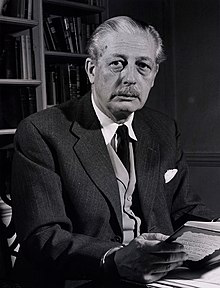

Prime Minister of the United Kingdom
10 February 1894 Belgravia, London, England
29 December 1986(1986-12-29) (92) Chelwood Gate, East Sussex, England
10 January 1957 – 18 October 1963
Prime Minister of the United Kingdom from 1957 to 1963 The Right Honourable The Earl of Stockton OM PC FRS Official portrait, 1959Prime Minister of the United KingdomIn office 10 January 1957 – 18 October 1963MonarchElizabeth IIDeputyRab Butler (1962–63) Preceded by Anthony EdenSucceeded by Alec Douglas-HomeLeader of the Conservative PartyIn office 10 January 1957 – 18 October 1963Preceded by Anthony EdenSucceeded by Alec Douglas-Home Ministerial offices Chancellor of the ExchequerIn office 20 December 1955 – 13 January 1957Prime Minister Anthony Eden HimselfPreceded by Rab ButlerSucceeded by Peter ThorneycroftSecretary of State for Foreign AffairsIn office 7 April 1955 – 20 December 1955Prime Minister Anthony EdenPreceded by Anthony EdenSucceeded by Selwyn LloydMinister of DefenceIn office 19 October 1954 – 7 April 1955Prime Minister Winston ChurchillPreceded by The Earl Alexander of TunisSucceeded by Selwyn LloydMinister of Housing and Local GovernmentIn office 30 October 1951 – 19 October 1954Prime Minister Winston ChurchillPreceded by Hugh DaltonSucceeded by Duncan SandysSecretary of State for AirIn office 25 May 1945 – 26 July 1945Prime Minister Winston ChurchillPreceded by Archibald SinclairSucceeded by The Viscount StansgateMinister Resident in Northwest AfricaIn office 30 December 1942 – 25 May 1945Prime Minister Winston ChurchillPreceded by New postSucceeded by Harold BalfourUnder-Secretary of State for the ColoniesIn office 4 February 1942 – 30 December 1942Prime Minister Winston ChurchillPreceded by George HallSucceeded by The Duke of DevonshireParliamentary Secretary to the Ministry of Supply In office 15 May 1940 – 4 February 1942Prime Minister Winston ChurchillPreceded by John LlewellinSucceeded by The Viscount Portal Parliamentary offices Member of the House of Lords Lord TemporalIn office 24 February 1984 – 29 December 1986 hereditary peerageSucceeded by The 2nd Earl of StocktonMember of Parliament for BromleyIn office 14 November 1945 – 25 September 1964Preceded by Edward CampbellSucceeded by John HuntMember of Parliament for Stockton-on-TeesIn office 28 October 1931 – 15 June 1945Preceded by Frederick Fox RileySucceeded by George ChetwyndIn office 30 October 1924 – 10 May 1929Preceded by Robert Strother StewartSucceeded by Frederick Fox Riley Personal detailsBornMaurice Harold Macmillan (1894-02-10 ) 10 February 1894 Belgravia, London, EnglandDied29 December 1986(1986-12-29) (aged 92) Chelwood Gate, East Sussex, EnglandResting placeSt Giles' Church, Horsted KeynesPolitical partyConservativeSpouse(s)Lady Dorothy Cavendish (m. 1920 ; died 1966 )Children4, including Maurice and CarolineAlma materBalliol College, OxfordOccupationPublisherpoliticianCivilian awardsOrder of Merit (1976)Peerage (1984)Military serviceAllegiance United KingdomBranch/service British ArmyYears of service1914–1920RankCaptainUnitGrenadier GuardsBattles/wars First World War Battle of Loos Battle of the Somme Military awardsVictory MedalBritish War Medal Maurice Harold Macmillan, 1st Earl of Stockton, OM, PC, FRS (10 February 1894 – 29 December 1986) was a British Conservative politician who was Prime Minister of the United Kingdom from 1957 to 1963. Caricatured as "Supermac", he was known for his pragmatism, wit and unflappability. Macmillan was badly injured as an infantry officer during the First World War. He suffered pain and partial immobility for the rest of his life. After the war he joined his family book-publishing business, then entered Parliament at the 1924 general election. Losing his seat in 1929, he regained it in 1931, soon after which he spoke out against the high rate of unemployment in Stockton-on-Tees. He opposed the appeasement of Germany practised by the Conservative government. He rose to high office during the Second World War as a protégé of Prime Minister Winston Churchill. In the 1950s Macmillan served as Foreign Secretary and Chancellor of the Exchequer under Anthony Eden. When Eden resigned in 1957 following the Suez Crisis, Macmillan succeeded him as prime minister and Leader of the Conservative Party. He was a One Nation Tory of the Disraelian tradition and supported the post-war consensus. He supported the welfare state and the necessity of a mixed economy with some nationalised industries and strong trade unions. He championed a Keynesian strategy of deficit spending to maintain demand and pursuit of corporatist policies to develop the domestic market as the engine of growth. Benefiting from favourable international conditions, he presided over an age of affluence, marked by low unemployment and high—if uneven—growth. In his speech of July 1957 he told the nation it had 'never had it so good', but warned of the dangers of inflation, summing up the fragile prosperity of the 1950s. He led the Conservatives to success in 1959 with an increased majority. In international affairs, Macmillan worked to rebuild the Special Relationship with the United States from the wreckage of the 1956 Suez Crisis (of which he had been one of the architects), and facilitated the decolonisation of Africa. Reconfiguring the nation's defences to meet the realities of the nuclear age, he ended National Service, strengthened the nuclear forces by acquiring Polaris, and pioneered the Nuclear Test Ban with the United States and the Soviet Union. After the Skybolt Crisis undermined the Anglo-American strategic relationship, he sought a more active role for Britain in Europe, but his unwillingness to disclose United States nuclear secrets to France contributed to a French veto of the United Kingdom's entry into the European Economic Community. Near the end of his premiership, his government was rocked by the Vassall and Profumo scandals, which to cultural conservatives and supporters of opposing parties alike seemed to symbolise moral decay of the British establishment. After his resignation, Macmillan lived out a long retirement as an elder statesman. He was as trenchant a critic of his successors in his old age as he had been of his predecessors in his youth. In 1986, he died at the age of 92. Macmillan was the last British prime minister born during the Victorian era, the last to have served in the First World War and the last to receive a hereditary peerage.

We use cookies
We use cookies and other tracking technologies to improve your browsing experience on our website, to show you personalized content and targeted ads, to analyze our website traffic, and to understand where our visitors are coming from. Privacy Policy.